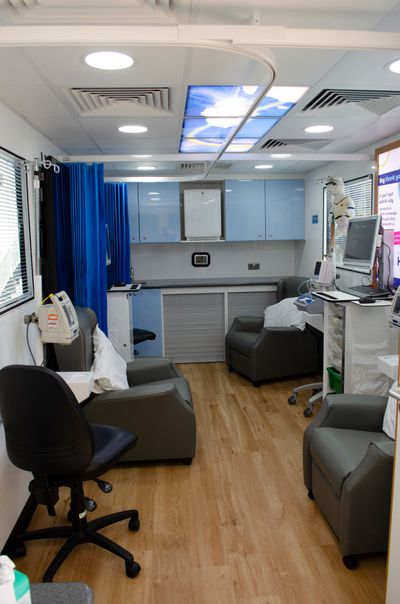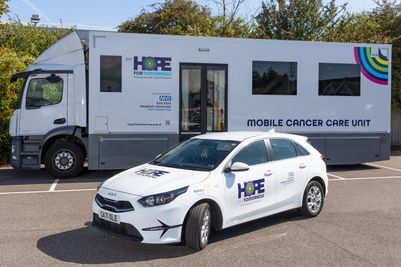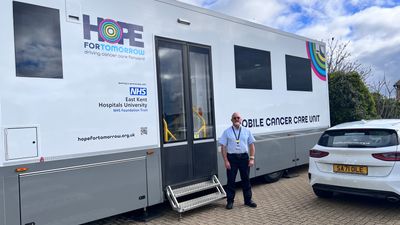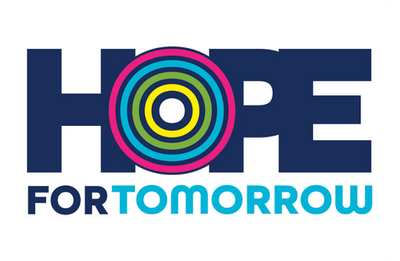Kent: Local Cancer Survivor Receives Royal Invitation
Published:
Read Time: 6 mins
Hope for Tomorrow charity’s vital cancer care work supported
3,571 patients in Kent last year
22 April 2025, East Kent: Bryan Baird, a testicular cancer survivor from Kent, has been invited by pioneering mobile cancer care charity, Hope for Tomorrow, to attend a Royal community reception this month hosted by HM The King and HM The Queen.
The exclusive event on 30 April at Buckingham Palace is being held in celebration of community-based cancer support initiatives raising awareness of the needs of patients.
It follows Hope for Tomorrow’s royal recognition by HRH Prince Michael of Kent at the charity’s special event in October last year, held at the Honourable Artillery Company, the historic home of the oldest regiment in the British Army.
Bryan’s invitation recognises not only his inspiring personal journey but his continued dedication to supporting the charity’s mission – to bring vital cancer treatment closer to communities with groundbreaking mobile care units. This saves patients both travel and hospital-related costs while easing pressure on NHS oncology departments across the country.
A retired firefighter from Kent Fire & Rescue Service, Bryan now drives Hope for Tomorrow’s mobile cancer care unit – Caron – named in memory of charity patron and TV Presenter Gloria Hunniford’s daughter, Caron Keating.
Bryan, who has been free of cancer since 1987, will join members of the Hope for Tomorrow team alongside Tina Seymour, CEO of Hope for Tomorrow, and charity supporters, volunteers, and partners, at the Palace reception this month in appreciation of the role he plays in helping make the lives of patients and nursing staff easier.
Bryan said: “I feel both honoured and excited to be asked to attend this reception at Buckingham Palace to celebrate cancer charities who partake in community-based initiatives, raising awareness about cancer and supporting those living with it.
“I am fortunate to have been connected with the amazing team at Hope for Tomorrow for almost 12 years as a Driver Assistant on the East Kent mobile cancer care unit – Caron - which operates from Canterbury Hospital and attends venues around East Kent carrying out a variety of cancer treatments.
“My job working on Caron is so much more than driving. I am there to make the lives of the patients and staff easier, whether that’s making cups of tea or just listening. Sometimes I just sit and hold their hand, or I let them vent if that’s what they want to do. We do our best to take as much stress out of the situation as we can.
“Hope for Tomorrow receives no government funding and relies 100% on charitable donations. Its team do an amazing job keeping a nationwide fleet of mobile units on the road, supplying and fully maintaining them for us. I have seen for myself the positive difference that coming to our unit can have on our cancer patients, making their lives so much easier by bringing their treatment to them. It makes the whole thing so worthwhile.”
Hope for Tomorrow partners with nine NHS trusts across England, operating Caron as one of its 14 mobile treatment units and support vehicles nationwide.
Stationed at the Kent and Canterbury Hospital in partnership with East Kent Hospitals University Foundation Trust, the unit visits Dover, Herne Bay and Cheriton and treated 3,571 patients last year.
Tina Seymour, CEO of Hope for Tomorrow, added: “We are incredibly proud to be attending such a prestigious occasion. It follows our special event last year attended by HRH Prince Michael of Kent. Our recent royal recognition is a testament to the hard work of our dedicated team, who work tirelessly to ensure that our mobile cancer care and support services reach patients across the country.
“Of course, this incredible work would not be possible without the support of our team, and our amazing fundraisers, event sponsors and corporate partners. Whether through Pay for a Day donations, which fund one of our units for a day, participation in and sponsorship of our Cuppa for Cancer Care campaign, which takes place each February, or the brilliant efforts of our individual fundraisers - each contribution is vital to our commitment to bring cancer care closer."
Hope for Tomorrow’s units provide cancer care to up to four patients at a time and an average of 20 patients a day, with a total of 26,760 patient visits across 42 locations between 2023 and 2024. 50% of these patients saved over £6 per visit on parking and reduced their travel by an average of 17.4 miles. On average they saved 2.5 hours per treatment.
Over half said it improved their chances of completing their treatment and 93% found it more convenient to have their cancer care on the mobile unit – giving their experience an overall rating of 4.91 out of 5.
Tina added: “The last few years have been incredibly difficult for the charity sector with individual donations down on average around 50% as the cost-of-living crisis persists. This comes as cancer diagnoses continue to rise. As a charity we have remained incredibly agile to support our fundraisers and corporate partners, and, as a result, we’ve launched a ‘Special Edition Corporate Sponsorship Pack’ in honour of this event with unique ways for businesses to get involved. We’ve also designed a special edition Hope for Tomorrow brooch, which we will be proudly wearing at the Royal reception as a symbol of support.
“Fortunately, thanks to the generosity of everyone we have managed to continue to invest in our services. From originally offering treatments, we now support the NHS with diagnoses and screening too. Exciting innovations include the recent launch of the world’s largest mobile lung assessment unit in Manchester in partnership with Cobalt Health, bringing cancer screening and diagnosis closer to communities.”
- ENDS
Ends
Editors notes
For more information on this press announcement please contact Verity Blake or David Ferguson at HeadOn PR: -
For images and assets to support this announcement, please visit the Hope for Tomorrow virtual newsroom here where you’ll find: -
- Images of the Hope for Tomorrow mobile units
- Images of attendees
- Headshot of Tina Seymour, CEO Hope for Tomorrow
- Image of Bryan Baird, driver of Caron, Hope for Tomorrow mobile cancer care unit
- Hope for Tomorrow logo
About Hope for Tomorrow
Hope for Tomorrow is a pioneering national charity based in Gloucestershire, founded in 2002 by Christine Mills OBE. In partnership with nine NHS Trusts, the charity has a fleet of 14 mobile cancer care units and support vehicles across England, bringing vital cancer services into communities. Its mission is to help people fit cancer care into their lives - rather than the other way around - saving patients time, travel, and cost, while easing the burden on NHS oncology departments. The world’s first mobile cancer care unit, Helen, was launched in 2007 by patron Sir Stirling Moss, setting the standard for a more accessible approach to cancer care, which is more convenient for and closer to the patients that need it.
Between 2023 and 2024, the charity’s units provided a space for more than 26,760 patient visits across 42 locations, with each unit treating up to 20 people a day. Hope for Tomorrow’s mobile cancer care units not only eliminate long hospital waits and travel times but also provides a welcoming, community-led environment - often set up in convenient locations like supermarket car parks, garden centres or community hospitals. Patients report significant benefits: 70% say they tolerate treatment better on the mobile units, over half believe it increases their chance of completing treatment, and many save on parking and fuel costs. The units currently serve regions including Gloucestershire, South Wiltshire, Kent, Suffolk, Essex, Yorkshire, Lincolnshire, and Norfolk.
Entirely reliant on charitable donations, Hope for Tomorrow raises funds through national campaigns and events like its flagship fundraiser, Cuppa for Cancer Care, launched in 2023 by Gloria Hunniford, and its annual Walk of Hope. Supporters can also fund a full day of treatment through Pay for a Day or take part in corporate sponsorships. Under the leadership of CEO Tina Seymour and a committed group of trustees, the charity continues to transform cancer care, including treatment, diagnosis and screening - making it more patient-centric, local, and life-enhancing for thousands across the country.





